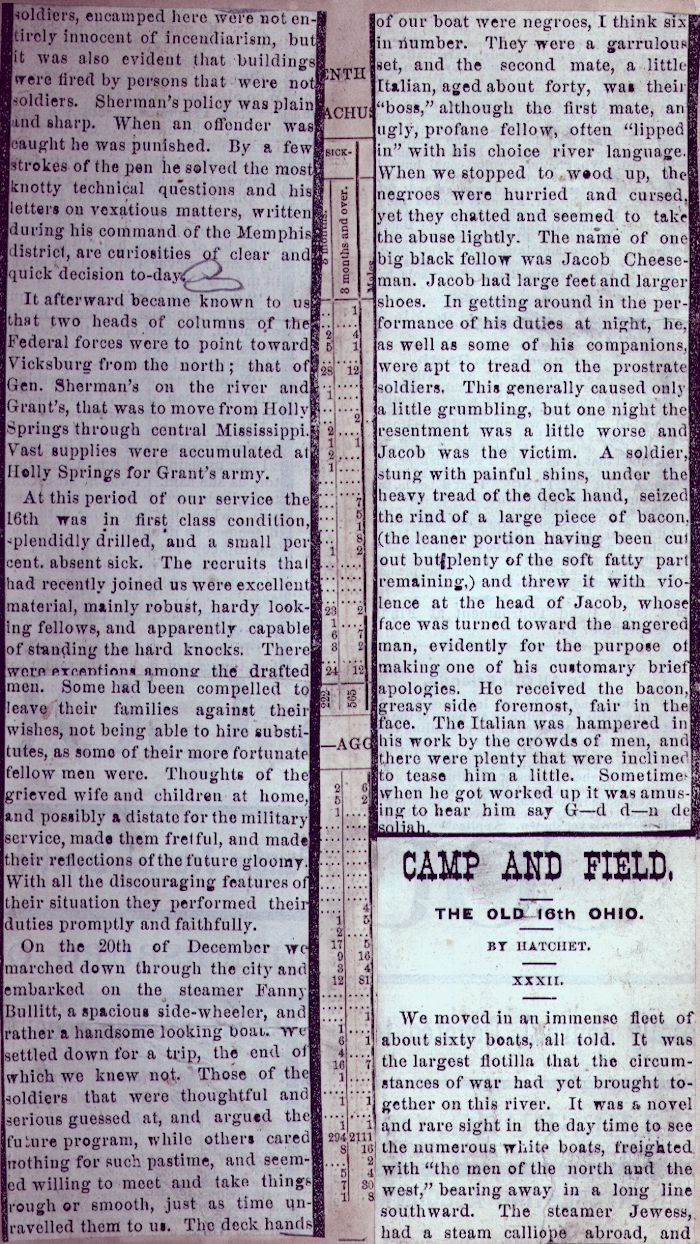| Camp & Field Page 50 | Camp & Field Index Page | 16th OVI Home Page | Camp & Field Page 52 |
The Camp & FieldArticles by Theodore Wolbach |
 Cpl. Theodore D. Wolbach |
The following image is taken from a book titled "Mortality and Statistics of the Census of 1850" in which it is believed retired Captain Rezin H. Vorhes, Company H, pasted over the pages a series of articles written by Cpl. Theodore D. Wolbach, Company E, titled "Camp and Field" and published, by chapter, in the Holmes County (Ohio) Republican newspaper from February 24, 1881 to August 17, 1882. The articles tell the story, in great detail and color, of the 16th OVI, from the inception of the 3-year regiment in October, 1861, through all its camps, battles and marches until it was disbanded on October 31, 1864. The articles pasted in the Vorhes book cover the first 35 chapters, published through October 20, 1881. All the remaining chapters were recently found in a Holmes County library by researcher Rob Garber who obtained copies, performed the transcriptions and provided to this website and which are also presented here, thus providing the complete work by Theodore Wolbach.
Throughout these articles click on the underlined white text for additional details.
The webauthor thanks 16th Ohio descendant Rob Garber for his excellent research on the Camp And Field articles and for performing the tedious digital transcription of those articles found on each page. The transcriptions were made to reflect the original articles verbatim, misspellings and all. Rob is the 3rd great nephew of Capt. William Buchanan, Company F, 16th Ohio, who served in the 90-day regiment as a private, re-enlisting in the three year regiment, and eventually making the rank of Captain of Company F. Thanks Rob!
Page 51 - Chapter 31, 32 - November/December, 1862
 |
soldiers, encamped here were not entirely innocent of incendiarism, but it was also evident that buildings were fired by persons that were not soldiers. Sherman's policy was plain and sharp. When an offender was caught he was punished. By a few strokes of the pen he solved the most knotty technical questions and his letters on vexatious matters, written during his command of the Memphis district, are curiosities of clear and quick decision to-day. If afterward became known to us that two heads of columns of the Federal forces were to point toward Vicksburg from the north; that of Gen. Sherman's on the river and Grant's, that was to move from Holly Springs through central Mississippi. Vast supplies were accumulated at Holly Springs for Grant's army. At this period of our service the 16th was in first class condition, splendidly drilled, and a small percent. absent sick. The recruits that had recently joined us were excellent material, mainly robust, hardy looking fellows, and apparently capable of standing the hard knocks. There were exceptions among the drafted men. Some had been compelled to leave their families against their wishes, not being able to hire substitutes, as some of their more fortunate fellow men were. Thoughts of the grieved wife and children at home, and possibly a distaste for the military service, made them fretful, and made their reflections of the future gloomy. With all the discouraging features of their situation they performed their duties promptly and faithfully. On the 20th of December we marched down through the city and embarked on the steamer Fanny Bullitt, a spacious side-wheeler, and rather a handsome looking boat. We settled down for a trip, the end of which we knew not. Those of the soldiers that were thoughtful and serious guessed at, and argued the future program, while others cared nothing for such pastime, and seemed willing to meet and take things rough or smooth, just as time unraveled them to us. The deck hands |
of our boat were negroes, I think six in number. They were a garrulous set, and the second mate, a little Italian, aged about forty, was their Published in Holmes County Republican XXXII. We moved in an immense fleet of about sixty boats, all told. It was the largest flotilla that the circumstances of war had yet brought together on this river. It was a novel and rare sight in the day time to see the numerous white boats, freighted with |
| Camp & Field Page 50 | Camp & Field Index Page | 16th OVI Home Page | Camp & Field Page 52 |